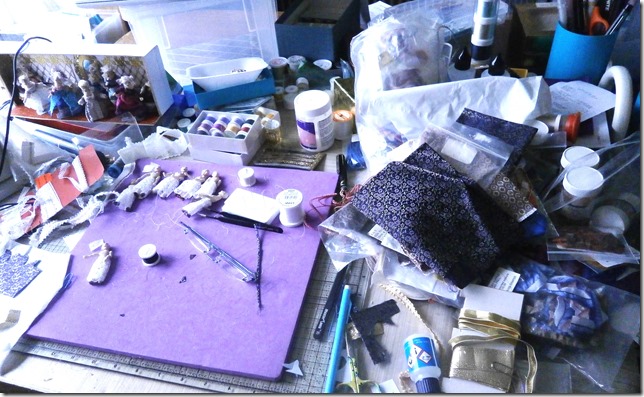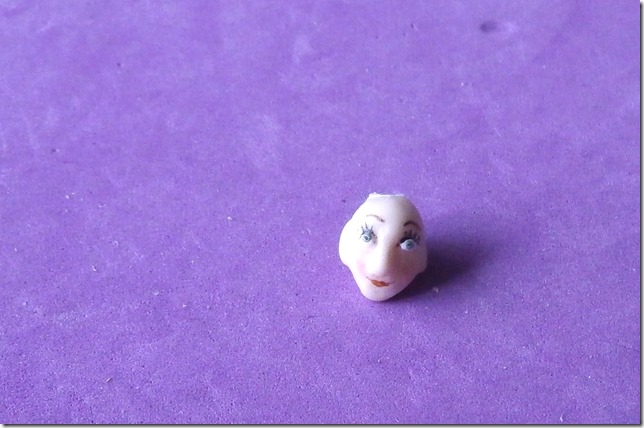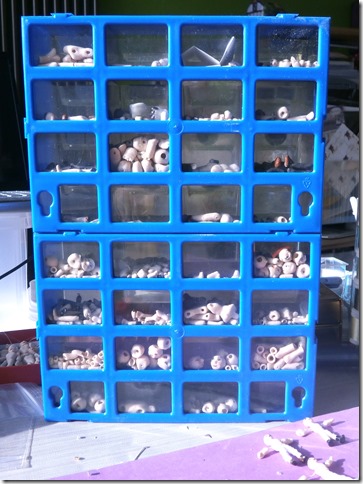Preparations are underway for the 100th Miniatura. If you have not already done so, take yourself to www.miniatura.co.uk go to the next show, how to get there and scroll down until you find a place to enter your email address, if you do so you will receive regular email updates about the plans of the exhibitors for the show, as they tell the organiser what the plans are. I already know of three special exhibits and the amazing thing I’m doing which I’ll tell you at the end of this column. The amazing thing has been planned since the last autumn show and ready since January.
However, until the end of the column, here is news of other plans I have. If you have seen me at the show, you know I always have a book for visitors to write in on my table. Visitors who like my style and have wishes they think I can fulfil, in porcelain, in miniature, write in the book and I will make a few at the next show and put them on the table to see how well the ideas collectors have put into my head, correspond with the ideas in their head. This, of course is one of the great virtues of the hobby in general and the collector’s paradise that is Miniatura in particular. Collectors can commission the items they wish to collect. I still have the 12 inkwells Terry Curran made for me to put in the desks in my school room. I never finished the desks or the school. I got more than half way and, as it was one of my first miniature buildings, gave up in disgust at my own incompetence. I learned from my mistakes and donated the school to a charity shop, but kept the inkwells, which were utterly perfect.
My wish list for the last show, you know about. It was Slight Versailles which everyone liked. The posh end of the eighteenth century is loved as much by miniaturists as it was by my father, who only inhabited the twentieth century out of force of habit, in his head he was always a couple of hundred years adrift; having cabriole legs and a bow fronted chest myself, I understand.
I do have quite a list wished upon me for the next show, including a horse. I did a unicorn many years ago. The wished-for horse exists in reality, I saw a photo on a phone in the middle of talking to hundreds of people. The horse had a friend, a special small horse with short legs (you and me both, Dobbin) but I’m not going to attempt that. Neither am I going to attempt the patches of colour on the normal sized horse, what I will be aiming for is a paint-it-yourself horse. Porcelain is porous and readily accepts many types of unfired colouring medium.
But before that, and the other items on the list, what I am thinking of is dolls.
Yes, I know I do dolls, the dolls I am thinking of are dolls for the dolls. Yes, dolls’ dolls. And, of course I could do dolls’ dolls’ dolls. Doll mad people did so in history. I did, for a while, 144th scale dolls, who would quite nicely be dolls’ dolls’ dolls’ dolls, they were fairly small.
I was helped, as I began what turned out to be a career of sorts making porcelain dolls, by a local museum. In a late fifteenth century building, which was, and is, suitably quaint, the county council displayed the collection of dolls of one main collector, who had had rampant doll mania. The collection featured some rare survivors. There were wooden dolls from the seventeenth century onwards, pedlar dolls, automata, fortune telling dolls, Jumeaux and everything you could possibly wish to see. I saw them all a lot. The building, however, became infested with beetles and was not even slightly airtight, so it closed as a museum in 2004 and the dolls were moved to another museum which is also closed. However, in the early days of living here I visited a lot and actually saw the dolls, which gives a much better idea of scale and the condition and manner of manufacture of the costumes than an illustration in a book.
Books are not too difficult to find about the history of dolls but good, well-researched books are thin on the ground. I recall reading soon after buying my kiln, a fanciful description in a standard work on the subject, about Victorian child labourers snatching red hot dolls from a kiln and throwing them along a line of children to a table. The evocation of child labour hell was not authentic; if you snatched any doll even slightly warm from a kiln and threw it through the air, it would suffer thermal shock and crack. Child labour was used in Victorian times for the production of many items. One of my first collections, in the late Fifties and early Sixties was Victorian china dogs that decorated mantelpieces of the time. Knowing how much china shrinks in the firing and seeing the size of some of my dogs, I think adult helpers must have been needed because the dogs, prior to firing, would have been up to two feet tall and very heavy. The work was probably piecework because the finish on some of the dogs is not good, the seams where parts are joined to make the whole shape are very obvious. Some of the china painting is definitely by children, most of my dogs have startling eyebrows and nice smiles. Adults may have done some finishing because those dogs with chains are decorated with gold paint, which is made with real gold dust and costs a lot, too much to let children get their hands on. If you find a book with illustrations of Victorian china-headed dolls you can spot those painted by a childish hand, even when the modelling allows for lines to paint inside.
Books about dolls will tell you that there were no dolls before the eighteenth century. There were but they were not called dolls until then. Prior to the eighteenth century, during Tudor times, dolls were known in England as Bartholomew Babies, being purchased at a famous fair, Bartholomew Fair, which was held at Smithfield, then outside London, in August, principally as a cloth fair but eventually having traders in everything. The Bartholomew babies were turned wooden shapes. Turning was a totally Tudor task. Every wood and forest of woody and forested England had numerous turners using pole lathes. Building on knowledge available since the iron age, woodworkers knew that a springy sapling could be used to power a turning frame, with a big branch fastened into it and rotating every time the sapling pulled back.. Apply your sharp iron tool to the wood and achieve a fancy corner for a building, a table leg, a bowl, a plate, a massive turned corner for a court cupboard and, at the end of the day, with the little branches left over, or a fair looming, the shape of a doll. Some Tudor dolls had leather arms but none that have been depicted or found so far, had feet other than a mono foot, like the foot of a table leg. Depictions of girls carrying their Bartholomew babies are in various Elizabethan paintings, if you were posh they were very nicely dressed.
Of course there were dolls before Bartholomew babies. There are Roman cloth dolls in museums, which survived by being buried with their deceased child owners. I remember, during a visit to a stately home with a collection of early nineteenth century costumes, being told by the curator, that of course, women of that era wore no underwear, because none had been found. My mother used to use my father’s string vests to polish the silver, though not when he was wearing them. Any that developed holes (tricky to spot in a string vest, but maybe obvious on a mangle roller) were seized upon with glee. Of course women throughout history wore underwear. In Tudor times and earlier, Spring weddings ensured that the right time of year had been reached to plant flax to harvest later in the year to make linen for swaddling cloths, nine months on. Swaddling cloths are the easiest item to weave, as anyone who was given a ‘My first loom’ set can attest to. If you can weave a strip you can weave a swaddling cloth and necessary underwear for yourself. If you have grown your own underwear, you are not going to throw it away. Every Victorian home with a scullery had a bowl in it, in which rags were soaking for feminine hygiene purposes. The rags which were not used for this, were mopping up cloths, or my father’s vests, polishing the silver.
Similarly, if someone turned you a doll, it would not be thrown away, it would be passed down until it was kissed to death. This is the case for dolls through history, we do know that mediaeval boys had hobby horses and toy knights, the depictions of them are in the margins of psalters and hand illustrated books. Girls are not depicted much because they were girls but any girl capable of sewing a sampler to prove herself marriage-worthy and able to sew clothes from her woven strips, could also sew a doll.
I am not going to make all the dolls’ dolls throughout history, just those that fit with the preferred miniaturising eras. I have previously produced old-type dolls as house residents. I did Lord and Lady Clapham, famous seventeenth century dolls with new, new every house-must-have-some fork hands. Prior to this we ate with a spoon and your own knife but suddenly forks arrived from the continent and everyone, even the dolls, knew about forks, in fact forkfluencers were everywhere. Dolls do tend to be followers of fashion, and trendsetters, ask Barbie.
I already have eighteenth century dolls’ dolls, who got left on the table before the show.
I have started miniaturising my seventeenth century fork-hands dolls. I will model a Bartholomew baby, because there was a request for a Tudor doll in my request book.
I need your input, what else would you like? Do you have a dolls’ house of an era with no doll? Do you have a model museum with a missing doll? Do you have a doll shop with a big blank where a doll should be? If you do have an opinion or a wish for the list, please let me know by clicking on the link below.
And now to the amazing plan for the show. I am going to have on my
oh bother! I’ve run out of room again. Next time, stay tuned.
~~~~~~~~~~~~~~~~








